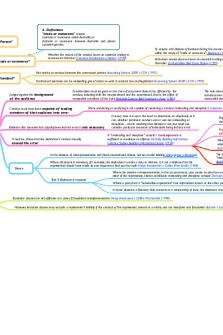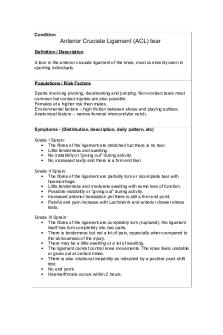S 18 ACL - S18 ACL PDF

| Title | S 18 ACL - S18 ACL |
|---|---|
| Course | Torts and Contracts II |
| Institution | University of Sydney |
| Pages | 1 |
| File Size | 105 KB |
| File Type | |
| Total Downloads | 26 |
| Total Views | 148 |
Summary
S18 ACL...
Description
2. Definition "trade or commerce" means: (a)trade or commerce within Australia; or (b)trade or commerce between Australia and places outside Australia;
"Person"
Restriction
Whether the nature of the conduct bears an essential trading or commercial character: Concrete Construction v Nelson (1990) "trade or commerce"
To acquire and dispose of business during the course of a corporate life falls within the scope of "trade or commerce": Bevanere v Lubidineuse (1985) Gratuitous service does not bear an essential trading or commercial character: E v Australian Red Cross Society (1991)
Not restrict to conduct between the contractual parties: Accounting System 2000 v CCH (1993) "conduct"
Contractual promises can be misleading, gist of action co-exist in contract law and legislation: Accounting System 2000 v CCH (1993)
Judged against the background of the audience
Consideration must be given to the class of consumers likely to be affected by the conduct, including both the inexperienced and the experienced, that is, the effect of reasonable members of the class: Parkdale Custom Built Furniture v Puxu (1982)
Conduct must have been capable of leading members of that audience into error
s 18
Conduct capable of being "misleading and deceptive"
Mere wondering or confusing is not capable of rendering a conduct misleading and deceptive: Campomar Sociedad v Nike International (2000)
Evidence that someone has actually been led into error is not necessary
It must be shown that the defendant's conduct actually caused the error
In every case it is up to the court to determine, as objectively as it can, whether particular conduct was or was not misleading or deceptive -- and in reaching that decision it can, but need not, consider particular instances of individuals being led into error. A "misleading and deceptive" result / consequence is sufficient to constitute an offence: Hornsby Building Information Centre v Sydney Building Information Centre (1978)
In the absence of misrepresentation and fraud concealment, silence will not render liability: Damagogue v Ramensky
Silence
The sole criteria is by assessing from the likely impact on a "hypothetical individual who would have been a member of that ordinary or reasonable class: Campomar Sociedad v Nike International (2000)
Where disclosure is necessary, for example, the defendant is under a duty to disclose, it is not a defence that the represented should have made its own inquiries to find out the truth: Henjo Investments v Collins Marrickville (1988)
Referred from the plaintiff's reliance on the defendant's misleading or deceptive conduct: Henjo Investments v Collins Marrickville (1988) However, the misleading and deceptive conduct need not be the sole cause to lead to the injury: Henjo Investments v Collins Marrickville (1988) Whether there is fault on the part of the defendant is irrelevant in deciding whether the conduct is "misleading or deceptive": Parkdale Custom Built Furniture v Puxu (1982) The intention of the defendant is irrelevant in deciding whether the conduct is "misleading or deceptive": Hornsby Building Information Centre v Sydney Building Information Centre (1978)
Where the positive misrepresentation, in the circumstances, may create an clear but erroneous impression in the mind of the representee, silence constitutes misleading and deceptive conduct: Damagogue v Ramensky (1992) Test if disclosure is required Where a party had a "reasonable expectation" that information known to the other party would be disclosed: Damagogue v Ramensky (1992) In some situation, a fiduciary duty amounts to a relationship of trust, the disclosure must be full and fair: Fraser v NRMA Holding (1995) Exclusion clauses are not effective in a case of fraudulent misrepresentation: Henjo Investment v Collins Marrickville (1998) Exclusion Clauses
However, exclusion clauses may exclude a representer's liability if the conduct of the representer, viewed as a whole, was not deceptive and fraudulent: Butcher v Lachlan Elder Realty
Liability is strict, no intention or negligence...
Similar Free PDFs

S 18 ACL - S18 ACL
- 1 Pages

ACL (sections 18, 29 remedies)
- 3 Pages

ACL Notes
- 4 Pages

ACL (sections 18, 29 remedies)
- 3 Pages

Tutorial 10 - ACL s 237
- 5 Pages

LAPORAN PENDAHULUAN RUPTUR ACL
- 9 Pages

ACL Alternative Final Exam
- 4 Pages

KNEE-ACL-tear
- 3 Pages

35 ACL - dsvsd
- 10 Pages

ACL Exam- Cases
- 5 Pages

ACL framework overview
- 22 Pages

ACL as Applied Law Diagram
- 1 Pages

Firewall, Proxy, ACL e DMZ
- 2 Pages

ACL Module Quiz 2 maha01
- 6 Pages

ACL Seminar 2 19 20
- 3 Pages
Popular Institutions
- Tinajero National High School - Annex
- Politeknik Caltex Riau
- Yokohama City University
- SGT University
- University of Al-Qadisiyah
- Divine Word College of Vigan
- Techniek College Rotterdam
- Universidade de Santiago
- Universiti Teknologi MARA Cawangan Johor Kampus Pasir Gudang
- Poltekkes Kemenkes Yogyakarta
- Baguio City National High School
- Colegio san marcos
- preparatoria uno
- Centro de Bachillerato Tecnológico Industrial y de Servicios No. 107
- Dalian Maritime University
- Quang Trung Secondary School
- Colegio Tecnológico en Informática
- Corporación Regional de Educación Superior
- Grupo CEDVA
- Dar Al Uloom University
- Centro de Estudios Preuniversitarios de la Universidad Nacional de Ingeniería
- 上智大学
- Aakash International School, Nuna Majara
- San Felipe Neri Catholic School
- Kang Chiao International School - New Taipei City
- Misamis Occidental National High School
- Institución Educativa Escuela Normal Juan Ladrilleros
- Kolehiyo ng Pantukan
- Batanes State College
- Instituto Continental
- Sekolah Menengah Kejuruan Kesehatan Kaltara (Tarakan)
- Colegio de La Inmaculada Concepcion - Cebu
